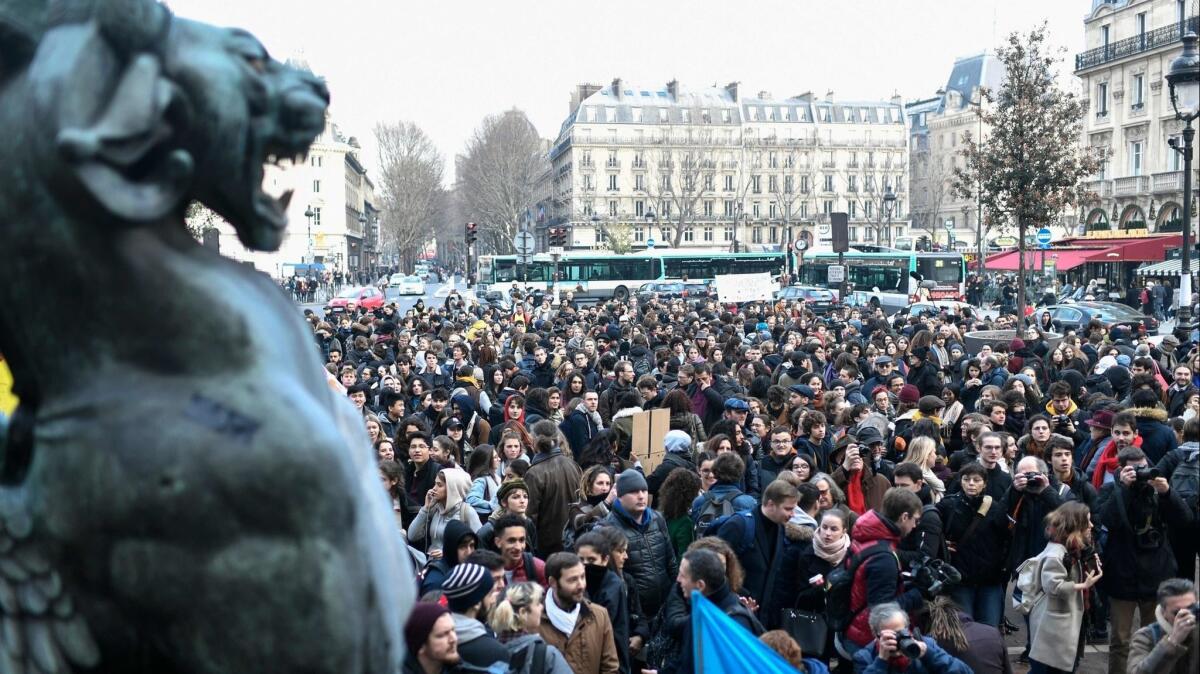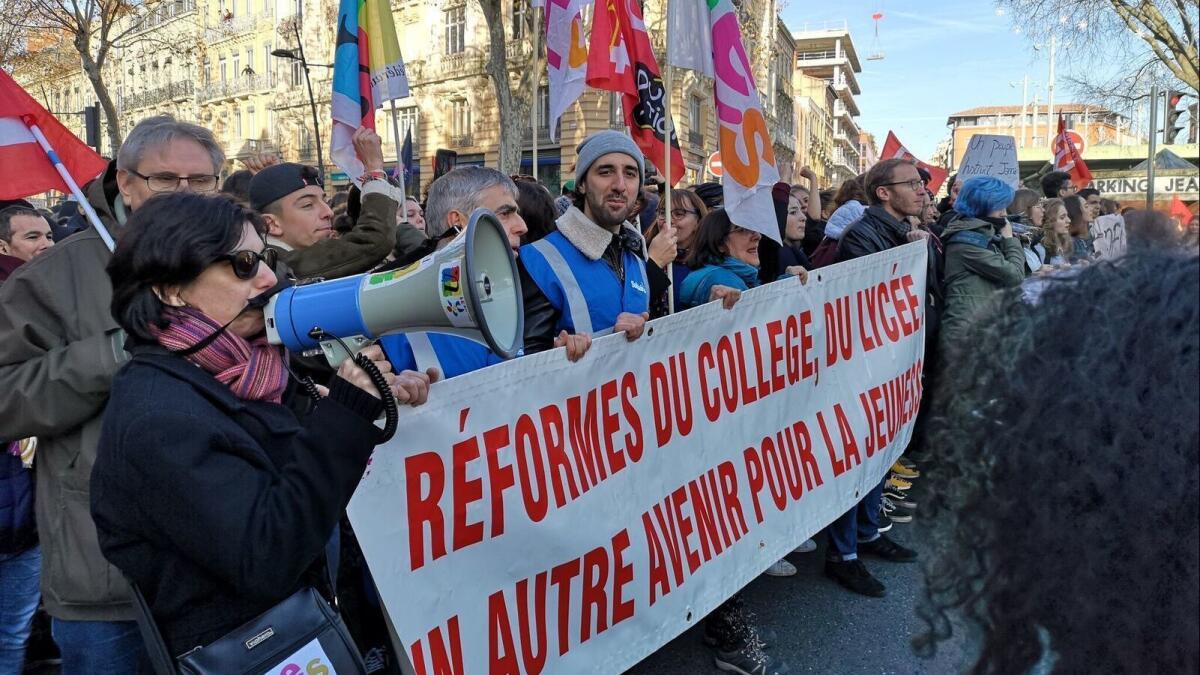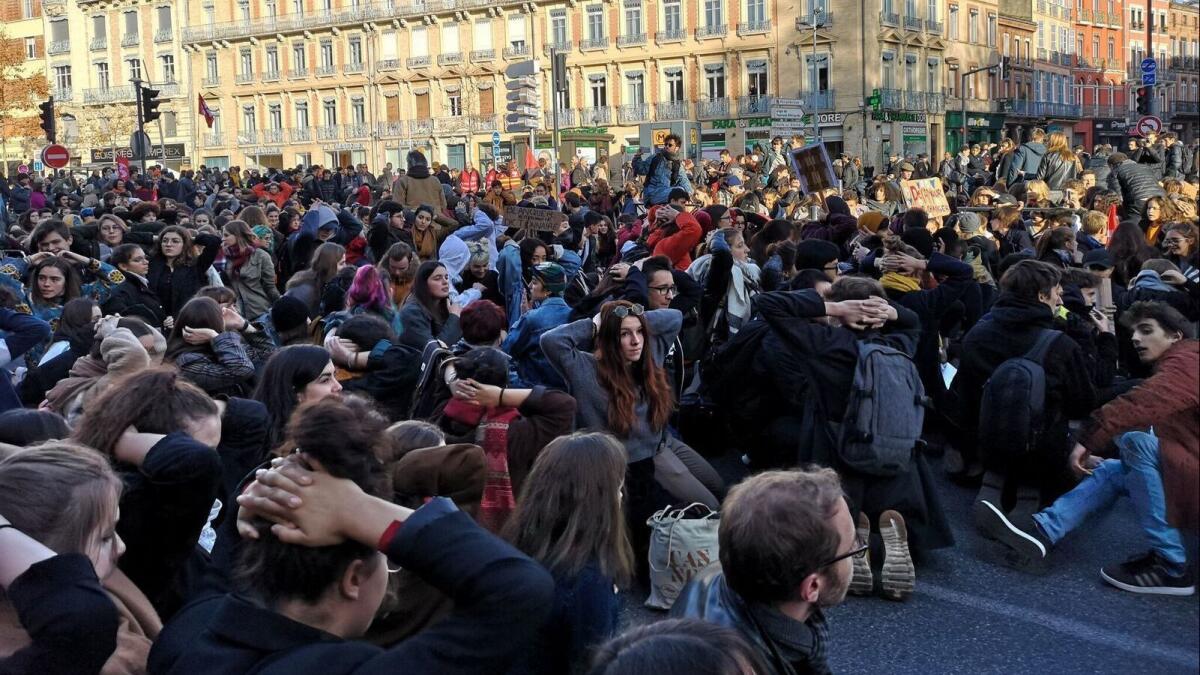Angry students, confused parents protesting Macron’s efforts to reinvent France’s treasured high schools

Reporting from Toulouse, France — Teachers are protesting in city centers. Students are setting fires and blocking schools. Parents are shouting chants into bullhorns.
A plan by President Emmanuel Macron’s government to reinvent the nation’s treasured high schools is not going over well in France.
Unveiled in February, the reforms are intended to revamp a system that critics see as too rigid, leaving students ill-prepared for college. But proponents say the changes — which include a rethinking of the famous “baccalaureate” finishing exam established by Napoleon — will create more inequality, and competition that leaves more kids behind.
The reforms have been cast as part of Macron’s broader efforts to upend and modernize nearly every corner of French life. But his administration’s determination to barrel ahead with implementing the reforms this year without having worked out all the details has provoked yet another fierce backlash for a government already under siege by the “yellow vest” protest movement.
“It’s a pretext to save money,” Laurence Meynadier, a science and technology teacher at Toulouse’s Stephane Hessel high school, told 200 parents gathered at a community center. “It’s going to create more competition between high schools for resources. And it’s going to create more inequality.”
The French are immensely proud of their education system, but there has been growing frustration that it is ill-suited for a rapidly evolving modern economy. Teaching at the middle school level still focuses heavily on rote memorization, and parents begin planning career choices when their children are as young as 11 so they can prepare for decisions about what to study in high school.
The 15-year-olds who don’t go to a professional school to learn a trade instead attend a general high school, or lycee, where they select between pursuing studies in literature, sciences or economics. After three years, they take the national standardized baccalaureate exam, the “bac,” which was established in 1808 and consists of a series to 10 to 12 tests over the course of a week.
Although the baccalaureate marks a grueling period of cramming and studying, 88.3% of students passed last year, with the rest having the option to repeat the last year of high school. The bac had been the sole requirement to graduate and move on to university — grades being seen as too susceptible to bias and gamesmanship.
The baccalaureate remains a centerpiece of French identity and a symbol of international excellence, but math and reading scores have declined in recent years. Worse, according to the French Education Ministry, 70% of students who go on to college don’t get a degree within the typical three-year period.
“The lycees are not well organized, and they are not associated with the needs of someone attending university,” said Pierre Mathiot, a professor at political science at the Sciences Po university in Lille.
Mathiot has been dubbed the “the father of the reform” for his role in writing the report that became the basis for the plan announced in February by Education Minister Jean-Michel Blanquer, a former director of a French business school.
Blanquer said the traditional baccalaureate is too complex and requires students to study too many subjects. With the reform, the new bac would consist of four tests, plus an oral presentation. The goal is to allow students to specialize and gain greater depth in some subjects.
The choice to concentrate on literature, science or economic science will disappear, replaced by a core curriculum and the requirement to choose three courses from 12 “specialties” such as math, art or a new program of digital studies. For the new bac, each student will be tested in French and philosophy. Two other tests will be based on two of the specialty subjects students chose. All students must make a 20-minute oral presentation related to the specialties. Graduation will be judged 60% on the baccalaureate, with evaluations and course grades counting for the rest.
Proponents say this offers greater flexibility and personalization. But teachers worry that the new system will do just the opposite by forcing greater specialization even earlier for students. Teachers are also suspicious of the reform because it coincides with a decision to cut 2,600 jobs in middle and high schools.
“We think the government is making a lot of propaganda around the reform,” said Guillaume Seve, one of 20 teachers who occupied Victor Hugo high school Thursday night in protest. “The government says this will bring more equality. But it’s a lie. And as teachers, we can see it’s a lie.”

Critics suspect the system increases inequality by introducing greater selectivity and competition. Students not offered a university spot can enter into government training programs for various careers.
The combination of changes has turned combustible at times. Many students have taken to setting objects like trash cans on fire, and last week one such blaze caused the Lycee Saint-Exupery in the nearby town of Blagnac to catch fire, burning the entire entrance and causing more than $1 million in damage.
“There are a lot of students who are quite anxious and upset,” said Muriel Paletou, president of the Toulouse region’s parents association. “This violence is an expression of that fear, but this reform is also being imposed in a way that’s also violent and very fast.”
Even before the new bac is rolled out, many high school students are upset by the introduction last year of a new college application platform called “Parcoursup,” short for “parcour superieur” or “path to higher education.” The lack of transparency around how Parcoursup works led many to suspect it was introducing even greater selectivity and competition among students who were once guaranteed admission to university if they passed the bac.
Earlier this week, about 1,200 high school students and teachers marched through Toulouse as part of a nationwide day of protest dubbed Black Tuesday. Chanting, “Macron is screwed, the youth are in the street,” they walked peacefully for an hour before gathering at the city’s victory arch monument, where hundreds of students got on their knees and placed their hands behind their heads for several minutes. The gesture has become a popular sign of solidarity with students at a Paris-area high school who last week were arrested by French police and forced to assume that position.
At nearby Lycee International Victor-Hugo in Colomiers, students have joined sporadic efforts to block entrances, frustrating some parents whose kids can’t enter and leaving teachers to deal with occasional fistfights and shouting matches.
“We are angry about Parcoursup,” said Jeanne Raufaste, 17, standing outside one such blockage at Victor Hugo last week. She said the older students were also there to support first-year students. “The quality of education is going to be worse.”
Opponents say they want implementation delayed for a “period of reflection.” But they worry their issues are being lost in the attention drawn to the “yellow vest” movement. At the march this week, several students and teachers were frustrated that Macron did not mention the baccalaureate reform during a nationally televised speech in which he announced several measures to address the “yellow vest” protests.
In a recent interview with French media, Blanquer dismissed the protests as people trying to take advantage of the “yellow vest” movement. He deplored some of the violent episodes and said critics were making a “caricature” of the reforms.
“The high school reform is intended to help them succeed after the baccalaureate by requiring them to dig deeper into new skills,” he said. “It would be absurd to shoot yourself in the foot by getting all worked up over other issues that have nothing to do with high school.”
Mathiot said in an interview with The Times that many of the criticisms are unfounded and the result of poor communication by Blanquer’s ministry. He said the current system is already unequal and forces early choices on students. And he promises plans are in motion to change entrance criteria for universities so that the specialty subjects in high school don’t limit what students can study later.
As for the backlash, Mathiot said it’s not so surprising that teachers and students are anxious during the first year of such a sweeping change.
“It’s really a revolution we’re trying to make, and it’s very profound. And it’s normal that there would be so much fear and worry,” Mathiot said. “But it’s something we must do, and more must be done to reassure people that we will be there to accompany them through this.”
O’Brien is a special correspondent.

More to Read
Sign up for Essential California
The most important California stories and recommendations in your inbox every morning.
You may occasionally receive promotional content from the Los Angeles Times.











